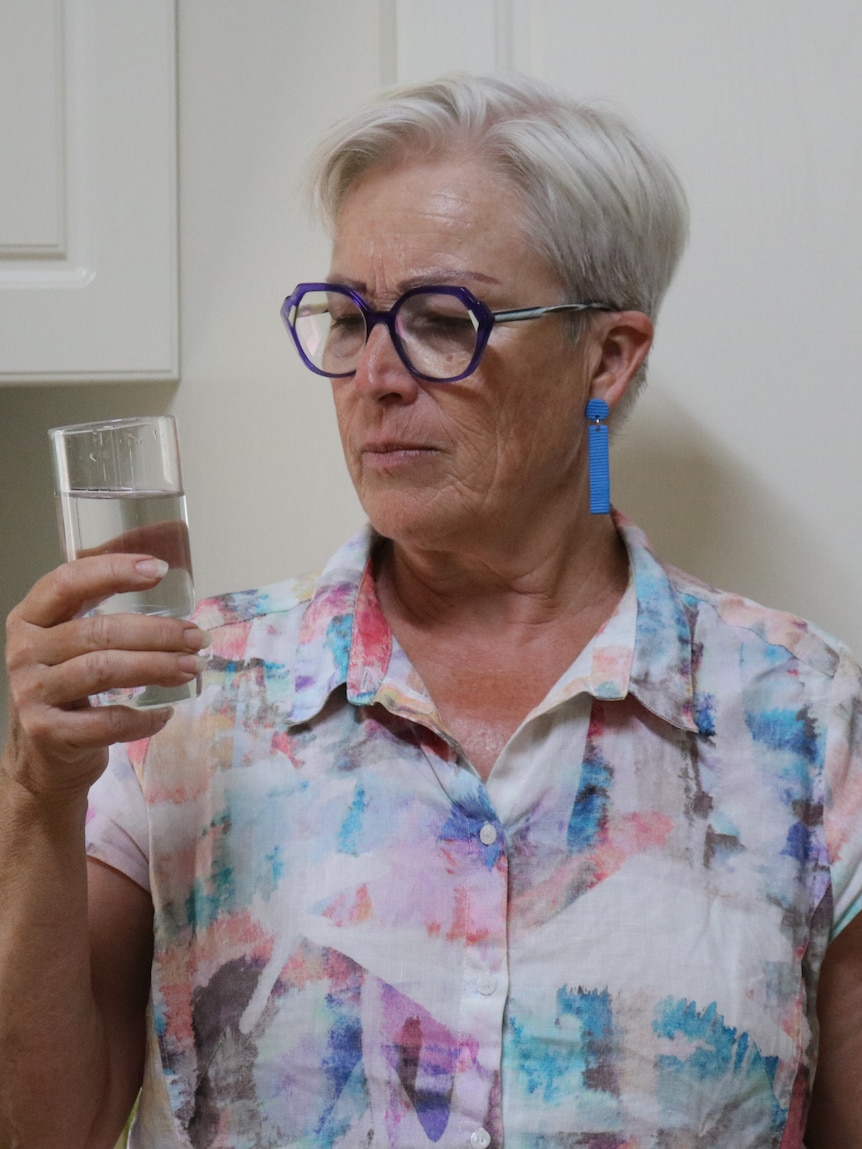It’s 39 degrees Celsius as Janet Nisted’s thirsty dog takes a sip of water from its bowl and walks away.
“The dogs don’t like the water here. They won’t drink it,” she told 7.30.
Welcome to Quorn, four hours north of Adelaide, where an ongoing crisis means the locals and their animals will not drink the tap water.
Even the state’s water utility, SA Water, concedes the water here breaches guidelines about how it should taste.
“The taste is terrible. It’s really salty and it just leaves sediment on everything,” Ms Nisted said.
“Soap doesn’t lather, shampoo doesn’t lather, your hair feels like straw and your skin is just dry and itchy.
“There are people that have lived here for 10, 20, 30, 40 years and they’ve had a gutful, literally, of the water here.”
Quorn’s 1,200 residents are supplied with water from a bore.
Flinders Ranges Mayor Ken Anderson said while the water was deemed safe under Australian Drinking Water guidelines, it was undrinkable — with high levels of minerals including sodium.
“Ninety-seven per cent of residents don’t drink it,” he told 7.30, citing a survey done by SA Water.
“You can be fooled into thinking it’s nice, because it has a clear look.
“You look at vinegar. Vinegar is very clear, and you go to drink that, you’re in for a bit of a shock and it’s not unlike our water.”
Quorn relies on tourism and has been a backdrop for movies including Gallipoli and TV series Wolf Creek and The Tourist.
Many residents have rainwater tanks but they are no solution in South Australia’s outback due to low rainfall.
“We spent $15,000 initially to put in extra water tanks and to have those plumbed in,” Ms Nisted said.
“We do rely on rainwater for pretty much everything. But it doesn’t rain much here. Our rainfall is really low and so we’re now at a situation where we’ve got to buy [water] in, and … that cost $675 just to fill one tank, so it’s very expensive.”
‘It destroys everything’
The taste is not the only problem. The minerals in the water are highly corrosive and Ms Nisted says residents have been left with hefty maintenance bills.
“It destroys plumbing or the fixtures and fittings. You have to replace those regularly. Hot water systems, showerheads, taps, toilets, systems — it pretty much destroys everything,” she said.
Mr Anderson showed 7.30 a damaged seven-year-old hot water system.
“You can see by the element … the dirt and associated minerals piled up in that hot water system is just atrocious,” he said.
Quorn’s residents pay the same price for their water as people do in Adelaide.
“If we were in Adelaide, this situation would have been fixed,” Mr Anderson said.
“Adelaide residents shouldn’t and wouldn’t put up with this, and the question is, why should we?”
On the blistering day 7.30 visited Quorn, the council-run swimming pool was shut because of corrosion to the pump.
“We have at least $50,000 a year from council … to fix the water quality issues and the problems they cause and that’s $50,000 that gets added onto people’s rates,” Mr Anderson said.
‘I will taste it’: SA water minister
Residents are demanding the SA government build them a desalination plant but Water Minister Susan Close said such an investment was not currently feasible.
“Quorn’s desalination plant would cost something like $50 million. How do we pay for that?” Ms Close said.
“The challenge is that we don’t have infinite amounts of money. When we do spend money with SA Water, it’s every single customer that pays for it.”
Ms Close said other water security projects were a higher priority because despite the bad taste, Quorn’s water was safe to drink.
“I haven’t tried it but of course, I will go up through that area before too long, and I will taste it. I understand it. I’m sympathetic,” she said.
“We have to put at the top of the list any water supply that is at risk of not meeting the drinking quality standards and Quorn’s does.”
Quorn is not the only regional town putting up with poor-quality water.
A 2022 article published in the journal NPJ Clean Water found almost 628,000 people across 408 Australian locations have issues with water quality.
The UN has set a goal to “achieve universal and equitable access to safe and affordable drinking water for all” by 2030.
Small businesses forced to act
Fed-up Quorn small business owner Deryck Carruthers has taken matters into his own hands by installing equipment to remove troublesome minerals from the tap water.
It was not cheap.
“For us, it was somewhere around that $10,000 mark of overall investment of actual equipment, [and] labour from a plumber,” Mr Carruthers said.
But the water-softening equipment is not a completely effective solution.
The dishwasher at Mr Carruthers’s and his partner’s retail and cafe business still has corrosion.
They also own the local laundromat, which they have considered closing.
“I personally don’t believe it’s worth replacing machines or continuing the viability of a laundromat with the water quality,” he said.
“For me, the square metreage of the real estate would be a much better investment in almost anything else that is not water-reliant.”
Despite the SA government giving no guarantees or a timeline for when Quorn’s water woes will be fixed, residents say they will not stop fighting.
“We asked the government for help in this situation, the help we got was that ‘we feel sorry for you but it’s too expensive’,” Mr Anderson told 7.30.
“I’m happy to send every minister down a bottle of water each week and they can make their cup of tea out of it and see how they go.”
Watch 7.30, Mondays to Thursdays 7:30pm on ABC iview and ABC TV




